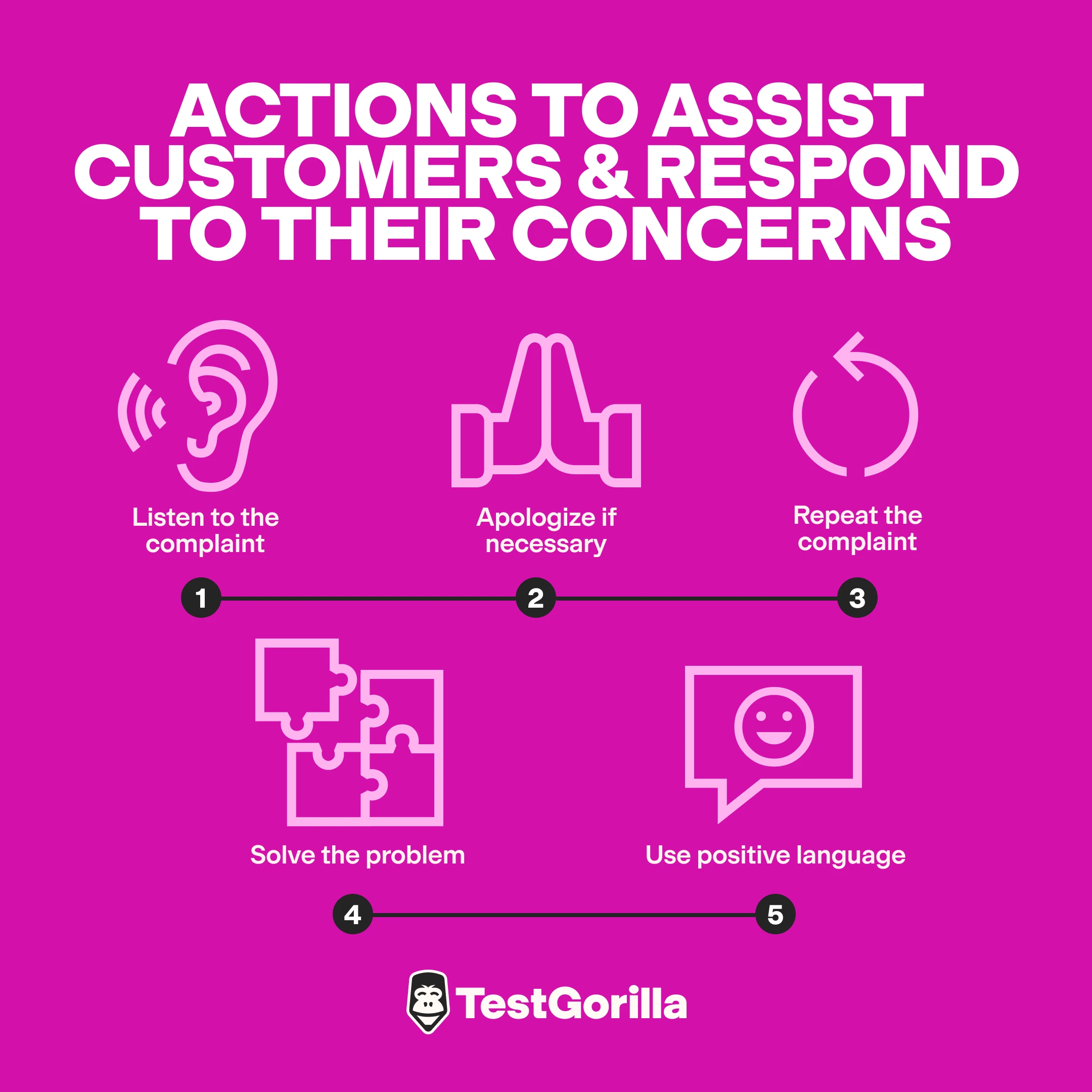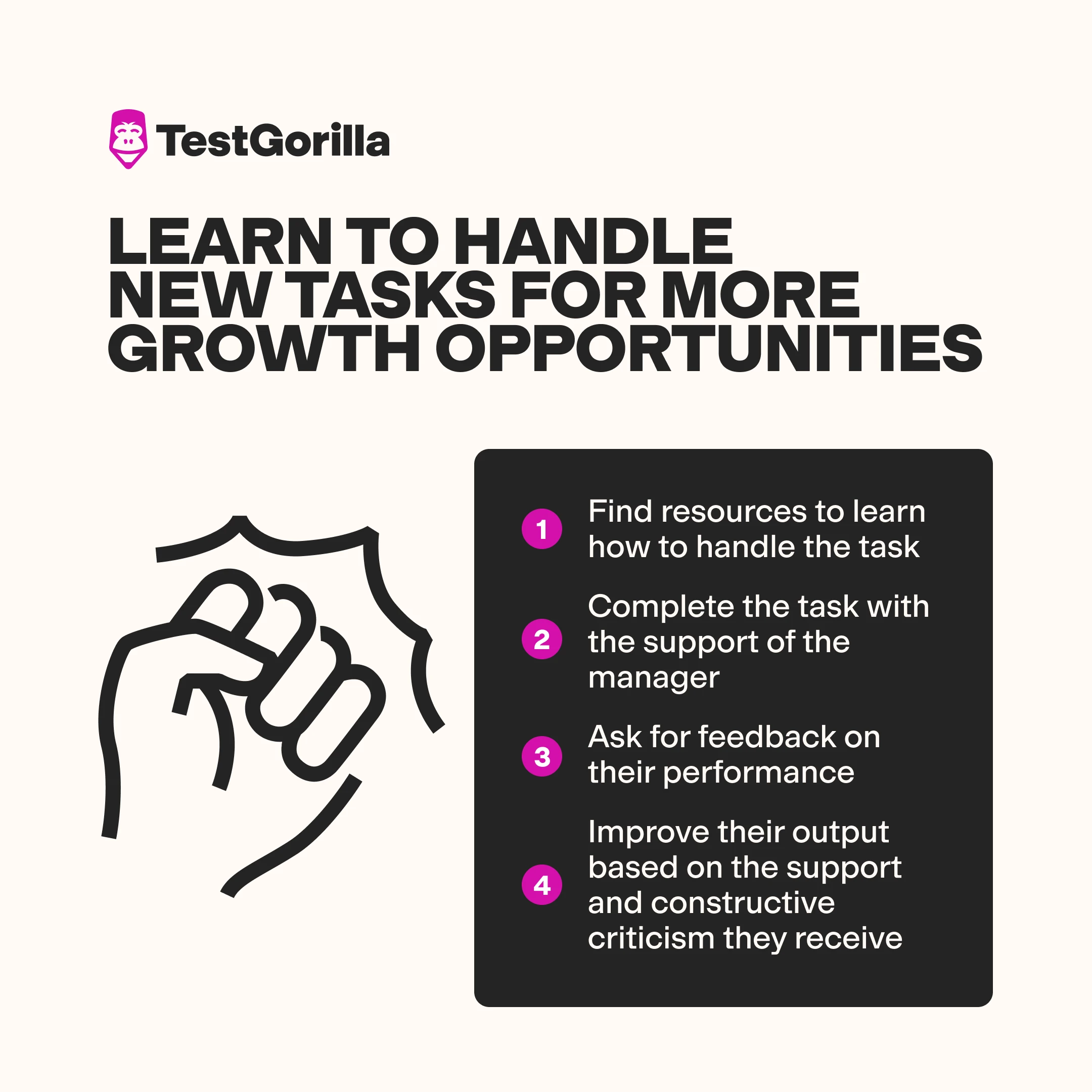20 scenario-based interview questions to ask candidates
Hire with confidence and find the perfect fit with TestGorilla
If you need to fill a vacancy in your organization, it’s important to determine how your applicants handle different role-specific scenarios.
There are two ways you can test this ability, and it’s best to combine both: You can ask candidates to complete a Situational Judgment test (in combination with other role-specific skill tests) and then interview the best ones.
The first step takes just a few minutes. You can use the TestGorilla platform’s expert-crafted skill tests to build an assessment. Then, you simply need to send the link to applicants and wait for the results.
For the second step, you need the right scenario-based interview questions to assess your applicants.
If you don’t know which scenario-based interview questions to ask, this article will help. Pick from the 20 questions below to get to know your candidates before you decide whom to hire.
Table of contents
20 scenario-based interview questions to ask candidates in an interview
Below, you’ll find our selection of 20 scenario-based interview questions you can ask applicants during interviews. Check the sample answers to learn what to listen for when you assess their responses.
1. How would you cope with a situation in which you realize you made a serious error at work?
With this scenario-based interview question, you can learn how your applicants learn from mistakes and whether they’re able to correct them. Be wary of applicants who claim they’ve never made any serious mistakes, because this might suggest they lack self-awareness and the ability to improve.
Instead, look out responses that list the actions a candidate would take to fix the error. For example, if a teacher makes an error when preparing a lesson plan, they might first focus on correcting it and then find ways to pay more attention to the details when creating the next plans.
The ideal answers will describe the situation, the applicant’s strategy to correct the error, and the benefits they could extract (f.e. reframe the situation as a learning opportunity), so listen out for responses with this structure.
2. What would you do if you received criticism from a team leader?
It might not be easy to receive criticism at work, especially for people who are eager to improve. Despite this, candidates should show they’re able to accept feedback, respond professionally, and take the right actions to improve. They can refer to hypothetical or real situations in which they received criticism and used it to improve their work.
For example, a candidate might’ve received feedback that they needed to improve their knowledge of the collaboration tools their company was using. In this scenario, the applicant might have used a few online tutorials to gain a better understanding of how to use each software tool and practiced their new skills right after.
3. Tell me about a time when you exceeded expectations.
Ask candidates this scenario-based interview question to learn if they have a strong work ethic. The responses you receive should describe real scenarios in which your applicants delivered more than what was expected of them.
Some applicants might have done more research than what was required, while others might have assisted coworkers who were struggling to stick to their deadlines. Whichever scenario they describe, listen for responses that explain how candidates’ efforts produced top results.
4. Tell us about a time you made a crucial decision in your current or past role.
It’s important to find out whether your applicants can cope with the pressure of making pivotal decisions in the workplace, because their choices can affect the company as a whole.
Consider whether your applicants are able to show their problem-solving skills when answering this question and be cautious of applicants who give examples of trivial decisions.
You can assess your candidates’ decision-making skills with our Business Judgment or Problem Solving skills tests. These tests assess problem-solving and decision-making skills in a business context.
5. How would you cope with a situation in which a coworker upset you?
Emotionally-charged conflicts at work can hinder productivity, so this scenario-based interview question is important. It helps you determine whether your applicants can handle such scenarios professionally.
Candidates should give an example of a time they were able to resolve a disagreement or a conflict with a coworker and explain how they achieved this. They might have used their communication and negotiation skills to find a common ground with coworkers and tackle the issue.
Listen for responses showing the candidate’s conflict-management skills. You can also assess these using our Communication or Negotiation skill tests.
6. How would you respond if confronted by a frustrated customer?
If you’re hiring a retail expert or customer service professional, ask them this question to assess their ability to be empathetic and diffuse tension. Applicants should prove their ability to stay level-headed by explaining how they would assist customers and respond to their concerns.
Some actions applicants can take to handle such a situation are to:
Listen to the complaint
Apologize if necessary
Repeat the complaint to confirm their understanding of the issue (active listening)
Use positive language
Solve the problem
An impressive 93% of clients are likely to become repeat customers if they receive good customer service, so testing your applicants’ customer service skills is well worth it.
Use our Customer Service test to find out whether your applicants are able to respond professionally when a frustrated client confronts them.
7. Can you share any methods you use to make coworkers understand your point of view?
In some situations, employees need persuasive skills to inspire, influence or motivate others. Be wary of applicants who use forceful techniques to convince coworkers to accept their point of view.
A few techniques can help applicants persuade others. Some include to:
Use the “what’s in it for them” method
Include inclusive pronouns – i.e. “we” instead of “I” – in the conversation
Leverage information and data to support their view
8. Tell me about a time you nearly missed a deadline. How did you handle the situation?
Completing work on time is essential for maintaining trust between a company and its clients, so it’s important to check whether applicants can monitor their time well. If you use this question in interviews, consider how they modified their approach to keeping track of time.
Some applicants might use time-tracking tools, while others might prefer regular check-ins with their managers. If they have to reschedule a deadline, how do they do this?
Time management is essential for staying on top of deadlines; you can assess this skill with our Time Management test to make sure candidates have this skill.
9. What would you do if you had to resolve a conflict between two team members?
Candidates should understand that proactive conflict resolution is key for improving productivity at work. Some applicants might encourage team members to communicate their concerns with each other, while others might play the role of mediators to solve a dispute.
Ask follow-up questions to learn whether their strategies are effective and watch out for applicants who never intervene in conflicts.
10. What would you do if a client asked you a product-related question and you were unsure of the right answer?
The key to assessing candidates’ responses to this scenario-based interview question is to consider whether they’re proactive and eager to assist.
Candidates should find ways to get the right information if they can’t respond to a customer’s query straight away; this is a basic expectation in customer service. They should never just try to come up with an answer without checking the details first.
Here are the steps candidates should take in this situation:
Tell the client they are unsure about the answer
Say that they’d be happy to find out more about it
Find the information the client was looking for
Answer the client’s query
Ask them if there are any other queries they can help with
11. What would you do if you made a mistake at work but no one noticed?
With this question, it’s easy to find out whether applicants’ have high integrity in the workplace. Candidates should explain that they would try to correct the mistake, even if coworkers didn’t notice it.
Again, be wary of applicants who claim they never make errors at work. Look out for those who are able to take responsibility for their mistakes and take corrective action.
For example, if a software developer’s work resulted in a bug in the application they’re working on, they should acknowledge it and try to fix it.
12. What methods do you use to complete tasks you’ve never done before?
Most employees want more growth opportunities, and working on new, unfamiliar tasks can help them achieve this goal. But, to check whether your applicants handle new tasks efficiently, consider if they can:
Find resources to learn how to handle the task
Complete the task with the support of the manager
Ask for feedback on their performance
Improve their output based on the support and constructive criticism they receive
13. How would you handle it if a coworker incorrectly accused you of a mistake?
Although some people may become defensive if someone blames them for a mistake they didn’t cause, candidates must show they’re able to remain professional. Applicants should explain how they would communicate and use active listening to handle the situation.
Those who respond to colleagues with statements such as, “You are wrong,” might not be a good match for your business because of their reactivity. Look for candidates who aim to analyze the situation and not simply attack the other person.
For example, would they talk with their coworker to learn why they believe they are responsible? Would they dig deeper and explain where the error comes from? Constructive conversations can help the candidate resolve the issue amicably.
14. Tell us about a time you provided feedback to your manager.
Providing constructive feedback to managers can help improve processes and outcomes, so checking how your candidates would go about doing this is a good idea.
A candidate who never gives constructive feedback to a manager may not be ideal for your company if you favor innovation and unique ideas. Instead, candidates who use these steps are ones to consider:
Give feedback in a one-on-one meeting
Focus on facts and statistics to support claims
Balance the discussion with positive feedback
Some applicants might also discuss the benefits of 360-degree feedback. This type of feedback can improve relationships, enhance productivity, and help discuss potential areas of improvement.
15. How would you describe a complex idea to a frustrated client?
Candidates should show empathy and use active listening when interacting with clients. This approach helps ensure the customer is willing to listen to them when they need to explain a complex idea.
To make things simple, candidates might provide a practical example or show clients how to achieve the results they want.
For example, if a client doesn’t understand how to use a new application, the candidate may show them how it works by using it themselves and helping them get started.
16. How would you respond if you learned that a coworker misunderstood your advice?
With this scenario-based interview question, you can assess your applicants’ communication skills to clarify ambiguous situations.
To prove their expertise, applicants might give you an example of such a situation and describe the methods they used to get their point across – or, alternatively, explain how they prevent misunderstandings in the first place.
For example, a team leader might deliver a presentation and leave enough questions for a Q&A session afterward to help clarify key concepts.
17. How would you deliver bad news to a coworker?
Suppose you’re hiring a team leader. In that case, it’s important to check how candidates deliver bad news to coworkers: The right techniques can enhance a team’s morale, while the wrong techniques may affect productivity.
Applicants should know how to balance good and bad news to ensure team members remain optimistic. They should also explain why the news is important and how it can benefit the team.
Managers’ own motivation is a crucial factor in handling difficult situations, because it helps unite teams. You can use our Motivation skill test to assess applicants.
18. You have an approaching deadline but lack data to complete a project. How would you handle this?
According to Harvard Business Review, only 35% of the projects that teams undertake worldwide are successful – and many fail because of insufficient data. Applicants may have many techniques for meeting deadlines, but if they lack enough data for the project, they might need to ask the client for more information.
Before you hire them, determine whether your candidate can communicate efficiently with clients to collect enough data and ask the right questions to figure out the project requirements.
19. How would you react if you faced a major problem at work?
This variation of “How do you handle challenges?” can test your applicants’ problem-solving skills in the workplace. Although there are many ways to handle major problems, your organization might prefer a candidate who is able to stay calm and use a methodical approach.
The best responses will mention the importance of critical thinking. This skill helps applicants:
Understand cause-and-effect relationships
Recognize other related issues
Use analytical skills to solve the problem
Check our Critical Thinking skill test if you need to assess a candidate’s ability to use new approaches to solve difficult problems.
20. Describe a situation in which you needed to adapt to change at work. How did you adjust?
Although employees might take time to adjust to changes at work, they can use several methods to achieve this faster. Three steps to get used to change in the workplace are to:
Recognize why the change is important
Remain optimistic about the change
Set short- and long-term goals to adjust to the change
It’s important to look for candidates who are flexible and willing to accept change, because your company will inevitably continue to develop over time.
To assess whether applicants have what it takes to adapt to change, use our personality and culture tests to learn about their personality traits and behavior.
At what stage of the hiring process should you use these scenario-based interview questions?
Before you use these scenario-based interview questions in your hiring process, make sure to assess applicants’ skills first.
In other words, you first need to create a skill assessment with individual tests and ask candidates to complete them. This will enable you to easily shortlist the most talented applicants and invite them to an interview, without wasting time with those who simply don’t have the right skills for the job.
This approach is much more accurate and objective than resume screening and enables you to easily avoid unconscious bias. Our platform will do all the hard work for you and provide you with a data-driven method to find winning candidates.
Ask scenario-based interview questions to hire top talent
The best way to hire top talent is to use skills assessments in combination with the right scenario-based interview questions – and TestGorilla can help with both.
All you need to do is select the best tests for your assessment from TestGorilla’s test library, ask applicants to complete it, and check the results to shortlist the best talent.
Creating an assessment is easy with our platform. If you need help, sign up for a free demo or try the platform for free.
Use skill tests and scenario-based interview questions to find the best match for your team. That’s the simplest and most efficient method to hire without bias or stress.
Related posts
Hire the best candidates with TestGorilla
Create pre-employment assessments in minutes to screen candidates, save time, and hire the best talent.
Latest posts
The best advice in pre-employment testing, in your inbox.
No spam. Unsubscribe at any time.

Hire the best. No bias. No stress.
Our screening tests identify the best candidates and make your hiring decisions faster, easier, and bias-free.
Free resources
This checklist covers key features you should look for when choosing a skills testing platform
This resource will help you develop an onboarding checklist for new hires.
How to assess your candidates' attention to detail.
Learn how to get human resources certified through HRCI or SHRM.
Learn how you can improve the level of talent at your company.
Learn how CapitalT reduced hiring bias with online skills assessments.
Learn how to make the resume process more efficient and more effective.
Improve your hiring strategy with these 7 critical recruitment metrics.
Learn how Sukhi decreased time spent reviewing resumes by 83%!
Hire more efficiently with these hacks that 99% of recruiters aren't using.
Make a business case for diversity and inclusion initiatives with this data.






















